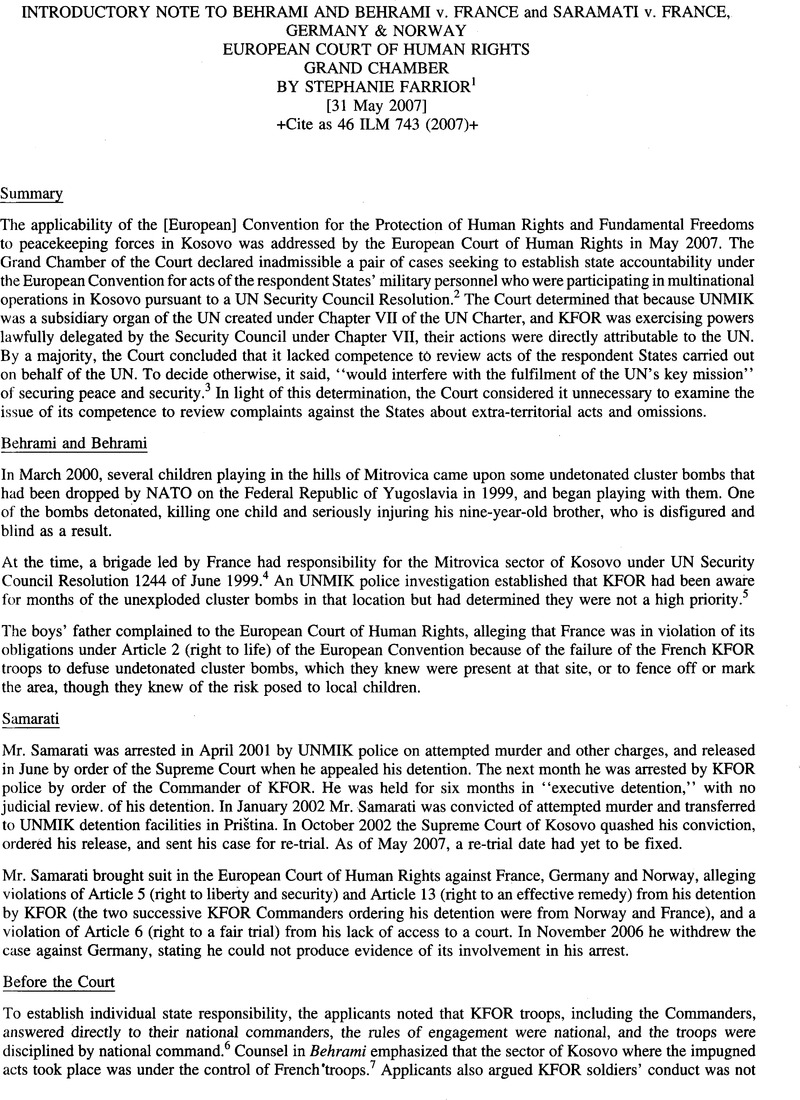No CrossRef data available.
Published online by Cambridge University Press: 27 February 2017

This text was reproduced and reformatted from the text appearing at the European Court of Human Rights website (visited July 23, 2007) <http://www.echr.coe.int/ECHR/EN/Header/Case-Law/HUDOC/HUDOC+database>.
1 Professor of Law and Director, Penn State Center for Applied Human Rights Research, Pennsylvania State University, Dickinson School of Law.
2 Behrami and Behramiv.France and Saramati v. France, Germany and Norway, European Court of Human Rights Grand Chamber, Decision on Admissibility (31 May 2007) (hereinafter,Behrami).
3 Id. at para. 149.
4 Each multinational brigade was under a national commander who applied national rules of engagement, but Kfor command retained operational control and command of the brigades. See Press release issued by the Registrar, European Court of Human Rights, Decision on Admissibility, Behrami and Behrami v. France and Saramati v. France, Germany and Norway (31 May 2007).
5 Behrami, supra note 1, at para. 6. The UNMIK police also reported Gadaf Behrami's death to be’ ‘unintentional homicide committed by imprudence.” Id.
6 They also pointed out that state accountability for acts of Kfor troops was feasible since a British court had determined it was competent to examine a case regarding the conduct of British Kfor troops.
7 This would bring it within the approach in Banković and Others v. Belgium and 16 Other Contracting States (appl. no. 52207/99), ECHR 2001, where the Court stated it had recognized extra territorial acts as an exercise of jurisdiction only where the State, through effective control of the territory and its inhabitants, exercises public powers normally exercised by the government of that territory.
8 Behrami, supra note 1, at para. 77.
9 Id. at para. 67.
10 Denmark, Estonia, Germany, Greece, Poland, the United Kingdom and Portugal.
11 Id. at para. 67.
12 Id. at para. 127.
13 It began its analysis by stating that “the key question was whether the Security Council retained ultimate authority and control so that operation command only was delegated. Id. At para. 133.
14 Id. at paras. 134-141.
15 Id. at paras. 142-143.
16 Id. at para. 149.
17 The case also has implications for what Amnesty International has called the United Nations’ “legacy of impunity” in Kosovo, see Amnesty International, ‘ “The UN in Kosovo, a legacy of impunity” (A1 Index: EUR 70/015/2006, Nov. 2006), and for what Human Rights Watch calls the “accountability gap” in Kosovo. Human Rights Watch, “Better Late Than Never: Enhancing the Accountability of International Institutions in Kosovo” (June 2007).
18 The Court had said the Security Council retained “ultimate authority and control.” See supra note 13.
19 Kasumaj v. Greece, appl. No. 6974/05, ECHR 2007.
20 European Roma Rights Centre, “Victims of Kosovo Poisoning Bring Lawsuit at European Court of Human Rights; Roma Seek Justice Internationally After Complete Failure by United Nations to Prevent or Remedy Extreme Environmental Harms” (Feb. 20, 2006),<http://www.errc.org/cikk.php?cikk=2519.> See also European Roma Rights Centre, “European Court of Human Rights Has No Jurisdiction in Kosovo Lead Poisoning Case,” <http://www.errc.org/cikk.php?cikk2568.>
21 Gajić v. Germany, European Court of Human Rights, app. No. 31446/02.
22 UN Security Council resolutions 678, 687 and 1441.
1 Al-Skeini and Others v. Secretary of State for Defense [2007] UKHL 26, available at <http://www.publications.parliament.uk/pa/ld200607/ldjudgmt/jd070613/skeini-1.pdf.>
* This text was reproduced and reformatted from the text appearing at the European Court of Human Rights website (visited July 23, 2007)<http://www.echr.coe.int/ECHR/EN/Header/Case-Law/HUDOC/HUDOC+database>.